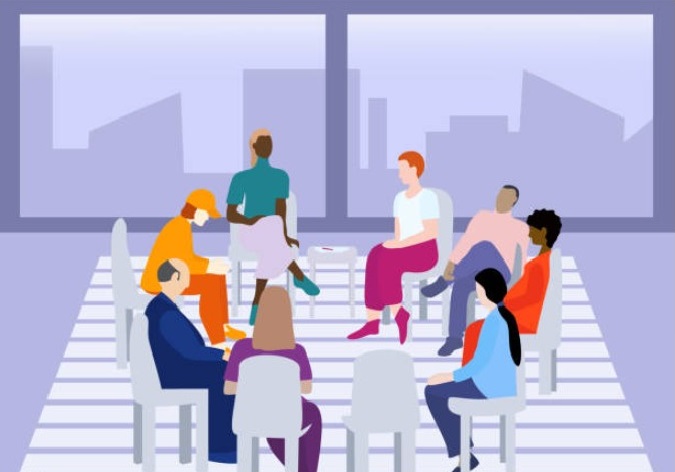
This is the first in a three-part blog series about IntraSpectrum Counseling psychotherapy groups, for those interested in learning more about group therapy or getting started with a group. ISC therapy groups provide safe & affirming spaces for clients to share their stories with others, make connections, receive support, learn new skills, and experience a sense of belonging, security and visibility. New therapy groups form each season of the year, and we invite you to join us.
If you’re ready to begin a specific therapy group that’s currently open for enrollment, simply submit an Inquiry Form on our website (where you can also get details about our Groups program, browse Group Therapy FAQs or submit a Groups contact form for detailed answers to your specific questions). If you’re info-gathering or perhaps just curious what group therapy is all about, we offer this blog (and the next two installments!) with lots of details that can help familiarize you with group therapy and how it works.
______________________________________________________
What is Group Therapy?
Group therapy is an effective form of psychotherapy in which a number of people meet together under the guidance of professionally-trained therapists, to help themselves and one another. There are different approaches to group therapy, but most are either (1) Process Groups that help clients learn new skills surrounding a specific issue or topic, or (2) Support Groups that help clients address issues they are struggling with. And what all good therapy groups share in common is creating a safe, supportive, and cohesive space to address personal, relationship and / or societal issues.
Is Group Therapy Effective?
Group therapy is typically just as effective as individual therapy! This is true for several reasons:
- First, most members identify with issues other members share and find they are helping themselves just by being present and processing the issues vicariously.
- Similarly, by listening and giving feedback to group members sharing their concerns, you may also be practicing new ways of interacting with others.
- Group therapy offers the opportunity to get multiple perspectives, increased support from peers, and a safe place to try out new behaviors and ways of being.
- The goals and objectives of group therapy often involve practical tactics to help address specific issues, both during group sessions and outside the group therapy environment.
What Does Group Therapy Help With?
Group Therapy can be an effective treatment for helping folks heal from emotional difficulties, learn new skills, increase relationship and social connections, and address a variety of concerns and issues:
- grow social skills, build confidence, learn more about yourself, practice empathy, accept others’ feedback
- process emotions in a social setting, feel supported through hearing about others’ journeys through similar or different situations
- hear a more diverse range of perspectives than in individual therapy, which may resonate more with you
- address a specific mental health concern
If Someone is in a Therapy Group, Do They Also Need Individual Therapy?
Group therapy may be used as the primary treatment approach, or it can be used along with individual therapy, but having an individual therapist is not a requirement for being in a group. Talk to one of our therapists during your intake appointment about what will best meet your needs.
- Group Therapy as Primary Treatment Approach: For people who are new to therapy, group therapy can be a comfortable way to ease into the concept of working with a therapist. Since there are several participants in a therapy group there is less pressure as well as some passive, reflective time involved. With a set start and end date, groups are usually less of a commitment than longer term forms of therapy like individual therapy. People typically find that even if they feel uneasy or embarrassed when they first join a therapy group, they soon develop feelings of belonging and trust. And because group therapy allows people a chance to talk with others in a private, confidential setting, many people discover a great sense of relief, processing and healing in group therapy.
- Group Therapy as Additional Treatment Approach: For some people, group therapy is a great add-on to individual, relationship, adolescent or family therapy. They may learn some new things about themselves through their interactions with other group members, and this learning can then be expanded upon in their individual work. In addition, the goals and objectives of group therapy often involve practical tactics to address individual, relationship or family issues, which can be a fresh and productive complement to the more introspective approaches of working one-on-one with a therapist.
What is Typically Addressed in Group Therapy?
Many groups are created to address a specific problem such as addiction, depression, obesity, panic disorder, social anxiety, chronic pain. Other groups focus on the intersectionality of mental health and identity or shared experience (e.g. QTBIPOC Individuals, LGBTQ+ Teens, Queer Men, etc.). And some groups share skills and strategies to help participants improve social skills, or deal with a range of issues such as anger, shyness, loneliness and low self-esteem.
Who Can Benefit from Group Therapy?
Group therapy can benefit people of different ages, sexual orientations, gender identities, and race, cultural and ethnic backgrounds who want help with specific concerns, such as depression, anxiety, serious medical illness, loss, trauma, lifestyle issues within a traditional culture, addictive disorders, or behavioral challenges. In addition, groups can benefit those seeking self-development by providing a safe environment in which to learn and grow.
- Sometimes, a therapist might suggest group therapy over other forms of treatment, because it’s a good fit for that individual or for treating their concern.
- Therapy groups have a fixed duration / number of sessions, making them a preferable form of therapy for those interested in short-term, practical and solution-focused treatment.
- Therapy groups can help people whose mental health makes it difficult to get through daily life, as well as those who may not have pressing concerns but still wish for training or support.
- Therapy groups can be a more accessible / affordable form of treatment for those without health insurance coverage or whose plan doesn’t cover mental health services. For example, ISC therapy groups accept insurance, are Sliding Scale eligible, or $60 per session OOP.
Will There be People with Similar Concerns in my Therapy Group?
Yes. It’s the therapists’ role to evaluate each person prior to forming the group. This is known as an intake appointment for a group. Usually, participants will be a mix of people who can all learn from each other. While some group members will have similar circumstances to you, it’s not necessarily true that all participants are dealing with exactly the same problem. In fact, people with different strengths and difficulties are often in the best position to share different perspectives and help one another.
What is the Difference Between an Open and Closed Therapy Group?
In open groups, new members can join the group at any time (“drop-in, drop-out” format). In a closed group, the group has a set duration, all members join at the same time and remain in the group for its duration, and only those members may participate in sessions. It is often easier to join an open group, but it may take longer for new members to get to know the existing members, especially if attendance is not mandatory. Members of a closed group get to know each other at the same time & can develop stronger bonds, but it may take longer until they can join a group that works for them. At this time, IntraSpectrum Counseling offers only closed-format therapy groups.
The Three Types of ISC Therapy Groups:
There are several different types of therapeutic groups, but therapy groups offered at IntraSpectrum Counseling can be divided into two main approaches. Support Groups are often structured to meet the needs of a greater variety of individuals (including perhaps the loved ones of people in addiction / recovery). They are usually more structured and include more presentations by the group leader. Conversely, Process Groups often have more of an “open floor” structure which encourages participants to share their lived experiences in the hope of receiving validation, feedback, and/or just the opportunity to speak and be heard. We also provide Skill Groups, which are designed to assist clients in learning or refreshing coping skills from an evidenced-based theoretical framework like Dialectical Behavior Therapy (DBT) or Cognitive Behavior Therapy (CBT). In these skill groups, participants identify and process current struggles, learn a skill that may assist in coping with their struggle and have the space to practice and/or personalize that skill to their daily lives in a supportive environment.
Your Roles / Responsibilities in Group Therapy:
Fully engaging in the group therapy process will help you (as well as the other participants) get the most out of group therapy. It’s also important to remember that group therapy often becomes easier over time, as confidence and trust between group members develop. As you prepare to begin, that engagement includes:
- Being sure the group meeting dates / time & location are compatible with your schedule
- Committing to attend each session (more on that, later)
- Participating in the group, respectfully – this includes active listening, active sharing, engagement with group activities, respect, and maintaining the confidentiality of group participants
How Do I Join a Therapy Group at ISC?
- If you are a new client interested in joining a Therapy Group that’s open for enrollment, please submit an Inquiry Form. Our Client Services team will schedule an intake appointment for you with one of the Group’s facilitators. This appointment gives you a chance to meet your potential therapist, ask questions, discuss your concerns and goals, and determine whether the Group is a good fit for your needs.
- If you are already working with an ISC therapist and are interested in joining a Therapy Group, please email groups@intraspectrum-chicago.com to start the process. Our Client Services team will contact you to set up a Groups intake appointment. Current clients may also speak with their ISC therapist about their interest in joining a therapy group.
- To be added to our Groups email list, for info about new and upcoming Groups, submit a Groups Contact form.
Click here to read the Group Therapy Guide, Part Two — including what to expect in group therapy sessions, and lots more things to know, before you go.
______________________________________________________
IntraSpectrum Counseling is Chicago’s leading psychotherapy practice dedicated to the LGBTQ+ community, and we strive to provide the highest quality mental health care for multicultural, kink, polyamorous, and intersectional issues. If you need affirming and validating support for individual, relationship, adolescent, family or group therapy, please click here to get started.
READ Group Therapy Guide, Part 2






 Today, July 26th, is National Disability Independence Day. This annual commemoration marks the day in 1990 when the Americans with Disabilities Act (ADA) was signed into law. The ADA enshrined several crucial civil rights protections for individuals with disabilities, but it still falls short of its intended goals after over 30 years on the books.
Today, July 26th, is National Disability Independence Day. This annual commemoration marks the day in 1990 when the Americans with Disabilities Act (ADA) was signed into law. The ADA enshrined several crucial civil rights protections for individuals with disabilities, but it still falls short of its intended goals after over 30 years on the books.